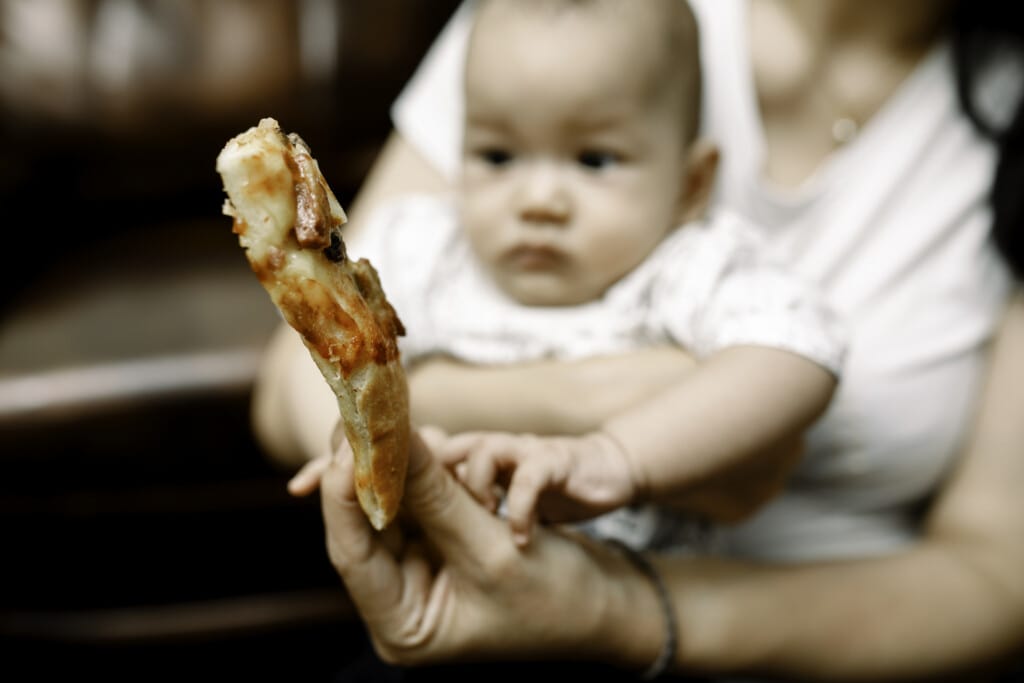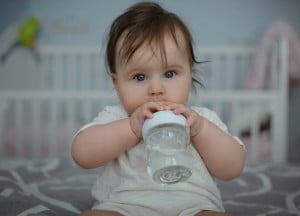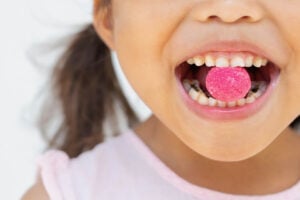Becoming a mom is fraught with many decisions you may never have thought of before. What to feed your baby once they are old enough to start solids is one of the most common questions parents ask. You may not realize that certain first foods for babies can be unsafe and should be avoided.
It can be easy to get caught up in what the media tells you to feed and not feed your little one as a new mom. For example, you might have heard that commercially processed food is safer for your baby than homemade food—but is this information factual? Information found within media platforms often does not provide scientific evidence to back their claims. This article will look at the most recent scientific evidence on what to avoid feeding your baby.
30 Worst First Foods That Are Unsafe and Should Be Avoided
1. Cow’s Milk
Let’s start with a popular topic — cow’s milk. Should you feed your infant cow’s milk as one of their first foods? It is best to avoid feeding your child cow’s milk until they are one year old.¹ Cow’s milk lacks certain nutrients like vitamin E and iron that are essential to optimal health. Your infant’s digestive system can also not process high levels of protein, sodium, or potassium — all of which cow’s milk is abundant in.
2. Pasta with Tomato Sauce
Spaghetti is one of the most simple recipes, but feeding this to your baby can be very harmful. Tomato sauce is often very high in salt, and as previously mentioned, your little one cannot process high sodium levels.
3. Honey
Although you may want to give your baby a sweet treat, honey is not the way to go! Contaminated honey is one of the leading causes of infant botulism.² Botulism results from a bacteria known as clostridium botulinum and is often deadly. If your infant ingests honey contaminated with this bacteria, botulism could occur.
4. Peanuts
Peanuts are packed with protein and healthy fats and could be a taste that your little one loves. Due to the hardness of peanuts, though, they are a choking hazard. It is best to avoid hard foods like nuts until your child is older. While introducing allergenic foods to your baby is a good idea, make sure that it is not a choking hazard. You can introduce them safely by offering smooth peanut butter, peanut soup, ground peanuts in yogurt, age-appropriate snacks that contain peanuts, etc.
5. Tea
If your child is feeling sick, you may think it is good to give them some hot tea to help them feel better. Although this sounds nice in theory, tea contains about 48 mg of caffeine per 8 ounces.³ That much caffeine entering the body of your little one can be harmful and even toxic at high doses.
6. Sunflower seeds
Sunflower seeds are very nutritious but can easily become lodged into your baby’s airway and lead to an infection. Along with nuts, seeds are very difficult for babies to chew and can increase their chances of choking.
7. Chocolate
Chocolate is not a food that we necessarily view as high in caffeine, but it certainly contains it!³ Due to this, giving chocolate to your little is not advised. Caffeine can negatively impact your baby’s functioning. Not to mention, most chocolate also contains cow’s milk!
8. Cupcakes
Your baby just turned another month old, and you want to celebrate! It is best to avoid celebrating with cupcakes or other desserts high in sugar. Foods high in sugar can increase the risk of your child becoming overweight.⁴ If you feed your child these foods often, tooth decay can occur.
9. Lunch Meat
As your baby continues to develop, so do their organs. If a food contains too much salt, like lunch meat, your infant’s kidney is likely too immature to process it.⁵ Giving your child too much salt can have adverse effects — like kidney damage.
10. Raw Vegetables
You are probably wondering, why are raw vegetables on the list of worst foods to give your infant? The reason that raw vegetables are listed is that they are a choking hazard. Raw vegetables are often very hard, which is tough for your little one to chew. Make sure you steam, soften, or purée your vegetables before giving them to your baby.
11. Home-canned vegetables and fruits
You may have spent the summer growing and canning different vegetables to enjoy. Although the home-canned items likely taste amazing, you should not share these with your newborn. Similar to honey, home-canned vegetables and fruits can result in infant botulism.
12. Soda
Soda is high in sugar, but it is also high in caffeine, making it a terrible choice for your baby!
13. Marshmallows
Marshmallows are soft and fluffy and may seem like a nice treat for your little one. Unfortunately, marshmallows are large, increasing your child’s risk of choking. They can also get stuck in the back of their mouth and are overall hard to swallow.
14. Pretzels
Since pretzels are high in salt, they are not the best option to feed your baby. Pretzels are also an extremely hard food, making it difficult for your little one to chew and swallow — leading to choking.
15. Fresh Tuna
Fish is often said to be beneficial for babies, but the high levels of mercury found in some types of fish can be extremely harmful.⁶ Fresh tuna contains high levels of mercury and should never be given to your baby.
16. Orange Juice
It might be surprising to see orange juice on this list, but it is here for a good reason. Orange juice is high in sugar and does not provide your baby with the necessary nutrients that he needs — like fiber, vitamin D, or zinc.⁶ Due to its high sugar content, tooth decay and stomach issues are also possible.
17. Too Much Water
Too much of a good thing can often be harmful. Giving your baby water too often may satisfy their appetite and negatively affect their breastmilk intake.⁶ When deciding between water and breastmilk/formula, always go with breastmilk/formula — they have all the nutrients your baby needs!
18. Unpasteurized food
Unpasteurized food can contain bacteria and parasites that can be very harmful to your little one.⁷ An example of unpasteurized food would be raw dairy products or unpasteurized juice. Most of our foods are pasteurized, but be careful if you shop at farmer’s markets or purchase homemade items from a farm or stand, as those products may not be fully pasteurized.
19. Watermelon
Watermelon is packed with nutrients, but it may not be the best food to give your baby who is starting solids. It can be too hard for your little one to chew and swallow — making it a choking hazard.
20. Processed/Refined Grains
Grains that are processed or refined provide little nutrients and are not beneficial to your baby. An example of a refined grain would be white bread or white rice.
21. Popcorn
Popcorn can be dangerous since it is another choking hazard. It shouldn’t be introduced to your child until they are four years old. Popcorn also contains high amounts of salt and is not best for babies.
22. Citrus Fruits
Citrus fruits can be very acidic, which can be very hard on your baby’s little stomach. These fruits can also cause a skin reaction in some sensitive infants around the mouth.
23. Gummies
Despite their high sugar content, gummies are also not ideal due to their sticky texture. Gummies can stick to your baby’s teeth and cause damage to their enamel.
24. Cereal
Breakfast cereals are best to avoid giving to your little one. Most have a high sugar and salt content, which is difficult for your baby to digest.
25. Ice Cream
You should skip ice cream when trying new foods with your child for countless reasons. Ice cream contains cow’s milk, high amounts of sugar, saturated fat, and sometimes even high amounts of salt. We’ve discussed these components individually, and combining them into one food could negatively impact your baby.
26. Frozen meals
To maintain a long shelf life, frozen foods are loaded with salt. High amounts of salt are rough on your little one’s stomach because they cannot process sodium effectively.
27. Chips
Not only are chips high in salt, but they can also be easily choked on. Chips can break into uneven, sharp pieces. These pieces can be difficult for your baby to chew and may even become stuck in their small throat.
28. Fast Food
Being a new mom can become busy, and sometimes fast food can sound very appealing. Even if you decide to get fast food for yourself, do not feed this to your little one. Fast food is packed with sodium, sugar, and saturated fat, none suitable for your infant.
29. Soft Cheese
Soft cheeses like feta cheese are not safe for your little one to eat. They are mold-ripened and can contain listeria — a bacteria that can cause your baby to become ill.⁸
30. Lollipops
The high sugar content of lollipops easily places them into the foods to avoid category. They are high in sugar and can cause teeth damage but are also very sticky. Sticky foods are best to avoid because they can be easily choked on.
The specific foods that are unsafe and should be avoided go beyond the foods listed here. Generally, it is best practice to avoid giving your baby food high in sugar, salt, and saturated fat. Avoiding large, sticky, uncooked, or hard foods will help prevent choking. When introducing your baby to new foods, always keep their health and safety in mind.





























